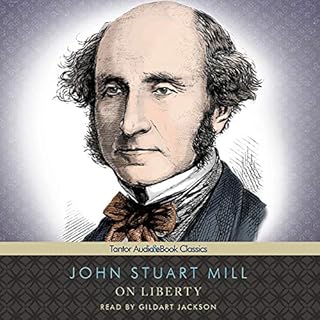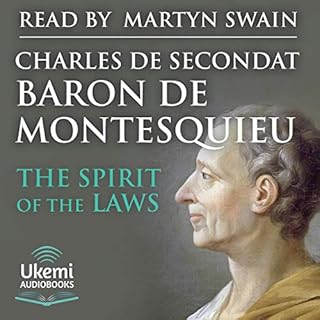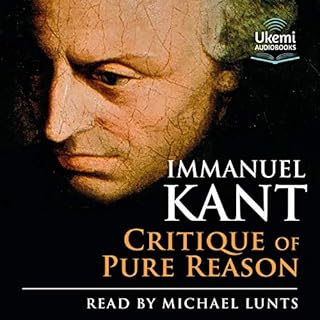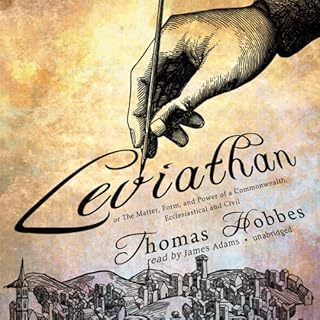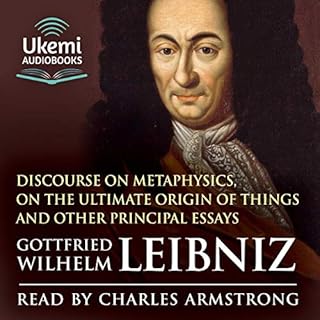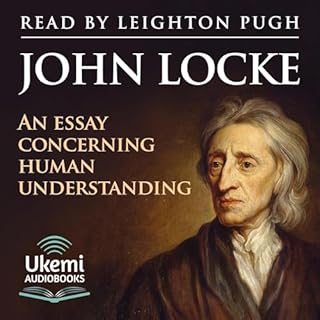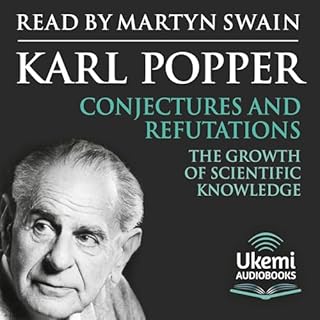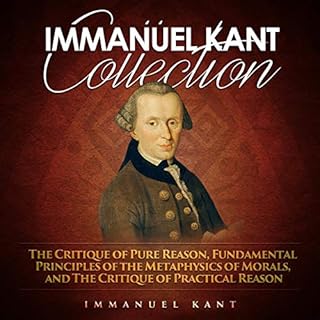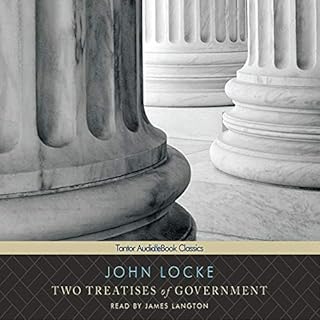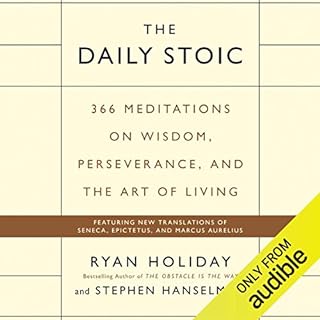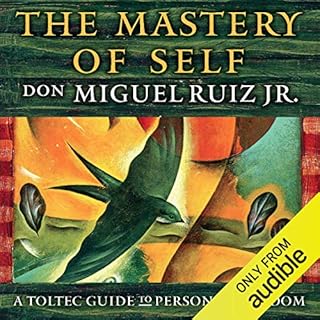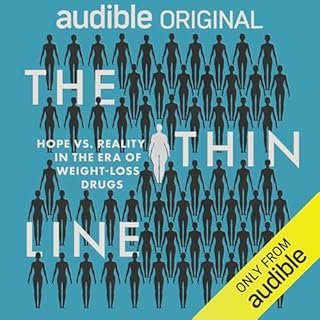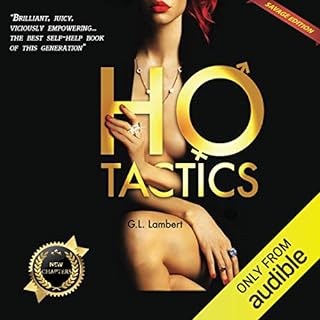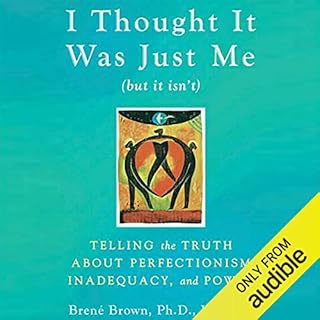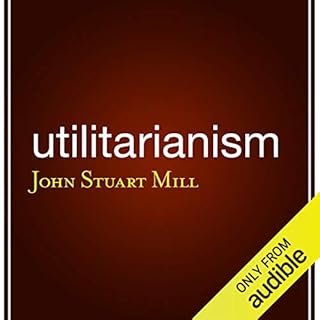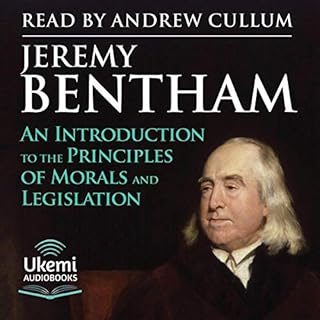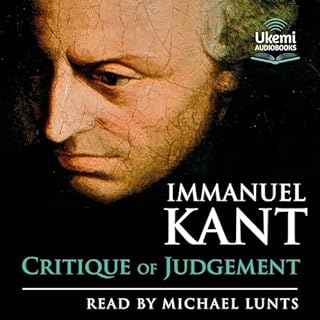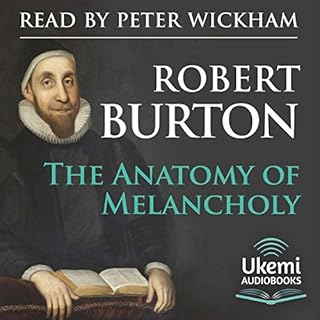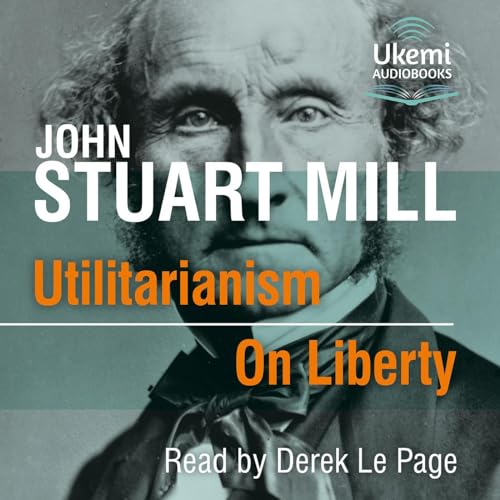
Utilitarianism/On Liberty
Failed to add items
Add to Cart failed.
Add to Wish List failed.
Remove from wishlist failed.
Adding to library failed
Follow podcast failed
Unfollow podcast failed
 Prime members: New to Audible?
Prime members: New to Audible?Get 2 free audiobooks during trial.
Buy for $20.00
No default payment method selected.
We are sorry. We are not allowed to sell this product with the selected payment method
-
Narrated by:
-
Derek Le Page
-
By:
-
John Stuart Mill
About this listen
John Stuart Mill (1808-1873) was a torchbearer for liberal thought in the 19th century, including liberty of the individual and freedom of speech, and he championed women's suffrage in Parliament. A remarkable man - he learned Greek aged three and at eight had read Herodotus, Xenophon and Plato - he campaigned all his life for a just society. These two essays are his key works.
In Utilitarianism (published in 1863, four years after On Liberty), Mill observes that 'the principle of utility' equates to the 'greatest-happiness principle' and that this should be the basis of an ethical life. Mill expands on this view in five chapters and deals with difficulties and criticisms, including the balance of individual versus general happiness.
In On Liberty (published in 1859 and written with his wife, Harriet Taylor, who died a year earlier), Mill applied his already established views on utilitarianism to the society and the state. He discusses the necessary balances between authority and liberty; the individual must have freedom, but within a utilitarian (greatest-happiness principle) compass. Nevertheless, he considers the 'tyranny of the majority', and he acknowledges that in certain societies rule by command may benefit the majority. But he emphasises the fundamental importance of individual liberty, so long as it does not harm others. Though it has had its critics, On Liberty remains a key document and has a special resonance for world politics today.
Public Domain (P)2016 Ukemi Productions LtdListeners also enjoyed...
-
John Stuart Mill Box Set
- Socialism; On Nature; & The Subjection of Women
- By: John Stuart Mill
- Narrated by: Museum Audiobooks cast
- Length: 8 hrs and 49 mins
- Unabridged
-
Overall5 out of 5 stars 2
-
Performance4.5 out of 5 stars 2
-
Story5 out of 5 stars 2
John Stuart Mill (1806-1873) had a profound influence on the shape of 19th-century thought and political discourse. His view of liberty justified the freedom of the individual in opposition to the unrestricted state. Mill favoured decentralised forms of socialism because he thought that a centralised model would discourage competition, neglect talent, and disregard freedom.
By: John Stuart Mill
-
The Theory of Moral Sentiments
- By: Adam Smith
- Narrated by: Michael Lunts
- Length: 16 hrs and 28 mins
- Unabridged
-
Overall4.5 out of 5 stars 123
-
Performance4.5 out of 5 stars 111
-
Story4.5 out of 5 stars 109
The Theory of Moral Sentiments (1759) was the first major text by Adam Smith who, seven years later, was to publish what was to become one of the major economic classics, The Wealth of Nations (1776). However, Smith regarded The Theory of Moral Sentiments as his most important work because in it he identified the profound human instinct to act not necessarily in self-interest but through, as he phrased it, a ‘mutual sympathy of sentiments’.
-
5 out of 5 stars
-
What Makes Humans Humane
- By Zeno on 10-06-18
By: Adam Smith
-
On Liberty
- By: John Stuart Mill
- Narrated by: Gildart Jackson
- Length: 4 hrs and 58 mins
- Unabridged
-
Overall4.5 out of 5 stars 693
-
Performance4.5 out of 5 stars 593
-
Story4.5 out of 5 stars 588
First published in 1859, John Stuart Mill's On Liberty is an exhaustive exploration of social and civic liberty, its limits, and its consequences. Mill's work is a classic of political liberalism that contains a rational justification of the freedom of the individual in opposition to the claims of the state.
-
5 out of 5 stars
-
should be read by liberals and conservatives
- By Jim Hennessy on 09-13-18
By: John Stuart Mill
-
The Spirit of the Laws
- By: Charles de Secondat Baron de Montesquieu
- Narrated by: Martyn Swain
- Length: 23 hrs and 36 mins
- Unabridged
-
Overall4.5 out of 5 stars 33
-
Performance5 out of 5 stars 28
-
Story4.5 out of 5 stars 28
From the moment of its publication in 1748, The Spirit of the Laws proved to be a controversial work provoking widespread interest. Within three years it had been translated into various European languages - and was swiftly added to the List of Prohibited Books by the Roman Catholic Church. It is a remarkable book, a potpourri of observations and comments ranging far and wide over the social activities of mankind and it exerted a great influence on political leaders in the following decades.
-
5 out of 5 stars
-
Truly Excellent Audiobook!
- By No to Statism on 09-09-19
-
Critique of Pure Reason
- By: Immanuel Kant
- Narrated by: Michael Lunts
- Length: 27 hrs and 38 mins
- Unabridged
-
Overall5 out of 5 stars 17
-
Performance5 out of 5 stars 16
-
Story4.5 out of 5 stars 15
Immanuel Kant’s Critique of Pure Reason can lay claim to being the most important single work of modern philosophy, a work whose methodology, if not necessarily always its conclusions, has had a profound influence on almost all subsequent philosophical discourse. In this work Kant addresses, in a groundbreaking elucidation of the nature of reason, the age-old question of philosophy: “How do we know what we know?” and the limits of what it is that we can know with certainty.
-
5 out of 5 stars
-
Another Great Recording by Ukemi
- By Jack on 03-27-21
By: Immanuel Kant
-
Leviathan
- or The Matter, Form, and Power of a Commonwealth, Ecclesiastical and Civil
- By: Thomas Hobbes
- Narrated by: James Adams
- Length: 23 hrs and 17 mins
- Unabridged
-
Overall4 out of 5 stars 241
-
Performance4.5 out of 5 stars 218
-
Story4 out of 5 stars 216
The leviathan is the vast unity of the State. But how are unity, peace, and security to be attained? Hobbes’ answer is sovereignty, but the resurgence of interest today in Leviathan is due less to its answers than its methods: Hobbes sees politics as a science capable of the same axiomatic approach as geometry.
-
4 out of 5 stars
-
For PoliSci Graduate Students as a Readalong
- By deborah on 01-14-12
By: Thomas Hobbes
-
John Stuart Mill Box Set
- Socialism; On Nature; & The Subjection of Women
- By: John Stuart Mill
- Narrated by: Museum Audiobooks cast
- Length: 8 hrs and 49 mins
- Unabridged
-
Overall5 out of 5 stars 2
-
Performance4.5 out of 5 stars 2
-
Story5 out of 5 stars 2
John Stuart Mill (1806-1873) had a profound influence on the shape of 19th-century thought and political discourse. His view of liberty justified the freedom of the individual in opposition to the unrestricted state. Mill favoured decentralised forms of socialism because he thought that a centralised model would discourage competition, neglect talent, and disregard freedom.
By: John Stuart Mill
-
The Theory of Moral Sentiments
- By: Adam Smith
- Narrated by: Michael Lunts
- Length: 16 hrs and 28 mins
- Unabridged
-
Overall4.5 out of 5 stars 123
-
Performance4.5 out of 5 stars 111
-
Story4.5 out of 5 stars 109
The Theory of Moral Sentiments (1759) was the first major text by Adam Smith who, seven years later, was to publish what was to become one of the major economic classics, The Wealth of Nations (1776). However, Smith regarded The Theory of Moral Sentiments as his most important work because in it he identified the profound human instinct to act not necessarily in self-interest but through, as he phrased it, a ‘mutual sympathy of sentiments’.
-
5 out of 5 stars
-
What Makes Humans Humane
- By Zeno on 10-06-18
By: Adam Smith
-
On Liberty
- By: John Stuart Mill
- Narrated by: Gildart Jackson
- Length: 4 hrs and 58 mins
- Unabridged
-
Overall4.5 out of 5 stars 693
-
Performance4.5 out of 5 stars 593
-
Story4.5 out of 5 stars 588
First published in 1859, John Stuart Mill's On Liberty is an exhaustive exploration of social and civic liberty, its limits, and its consequences. Mill's work is a classic of political liberalism that contains a rational justification of the freedom of the individual in opposition to the claims of the state.
-
5 out of 5 stars
-
should be read by liberals and conservatives
- By Jim Hennessy on 09-13-18
By: John Stuart Mill
-
The Spirit of the Laws
- By: Charles de Secondat Baron de Montesquieu
- Narrated by: Martyn Swain
- Length: 23 hrs and 36 mins
- Unabridged
-
Overall4.5 out of 5 stars 33
-
Performance5 out of 5 stars 28
-
Story4.5 out of 5 stars 28
From the moment of its publication in 1748, The Spirit of the Laws proved to be a controversial work provoking widespread interest. Within three years it had been translated into various European languages - and was swiftly added to the List of Prohibited Books by the Roman Catholic Church. It is a remarkable book, a potpourri of observations and comments ranging far and wide over the social activities of mankind and it exerted a great influence on political leaders in the following decades.
-
5 out of 5 stars
-
Truly Excellent Audiobook!
- By No to Statism on 09-09-19
-
Critique of Pure Reason
- By: Immanuel Kant
- Narrated by: Michael Lunts
- Length: 27 hrs and 38 mins
- Unabridged
-
Overall5 out of 5 stars 17
-
Performance5 out of 5 stars 16
-
Story4.5 out of 5 stars 15
Immanuel Kant’s Critique of Pure Reason can lay claim to being the most important single work of modern philosophy, a work whose methodology, if not necessarily always its conclusions, has had a profound influence on almost all subsequent philosophical discourse. In this work Kant addresses, in a groundbreaking elucidation of the nature of reason, the age-old question of philosophy: “How do we know what we know?” and the limits of what it is that we can know with certainty.
-
5 out of 5 stars
-
Another Great Recording by Ukemi
- By Jack on 03-27-21
By: Immanuel Kant
-
Leviathan
- or The Matter, Form, and Power of a Commonwealth, Ecclesiastical and Civil
- By: Thomas Hobbes
- Narrated by: James Adams
- Length: 23 hrs and 17 mins
- Unabridged
-
Overall4 out of 5 stars 241
-
Performance4.5 out of 5 stars 218
-
Story4 out of 5 stars 216
The leviathan is the vast unity of the State. But how are unity, peace, and security to be attained? Hobbes’ answer is sovereignty, but the resurgence of interest today in Leviathan is due less to its answers than its methods: Hobbes sees politics as a science capable of the same axiomatic approach as geometry.
-
4 out of 5 stars
-
For PoliSci Graduate Students as a Readalong
- By deborah on 01-14-12
By: Thomas Hobbes
-
Discourse on Metaphysics, On the Ultimate Origin of Things and Other Principal Essays
- By: Gottfried Wilhelm Leibniz
- Narrated by: Charles Armstrong
- Length: 5 hrs and 14 mins
- Unabridged
-
Overall4.5 out of 5 stars 44
-
Performance5 out of 5 stars 40
-
Story4.5 out of 5 stars 40
This Leibniz collection contains some of the philosopher’s most important works and ideas, spans three decades and illuminates the fascinating intellectual journey undertaken by him in his quest for truth. A prodigious polymath, Leibniz was a mathematician, philosopher, physicist and statesman and engaged with a sweeping range of ideas and disciplines, striving throughout his life to be at the cutting edge of scientific thinking. These Principal Essays are arranged in chronological order.
-
5 out of 5 stars
-
Philosophy at it’s best
- By Roman Greenberg on 02-03-22
-
On the Genealogy of Morals
- A Polemic
- By: Friedrich Nietzsche
- Narrated by: Duncan Steen
- Length: 6 hrs and 33 mins
- Unabridged
-
Overall4.5 out of 5 stars 469
-
Performance4.5 out of 5 stars 412
-
Story4.5 out of 5 stars 405
In On the Genealogy of Morals, subtitled "A Polemic", Nietzsche furthers his pursuit of a clarity that is less tainted by imposed prejudices. He looks at the way attitudes towards 'morality' evolved and the way congenital ideas of morality were heavily colored by the Judaic and Christian traditions.
-
5 out of 5 stars
-
Be strong, not weak.
- By Wayne on 06-24-13
-
An Essay Concerning Human Understanding
- By: John Locke
- Narrated by: Leighton Pugh
- Length: 30 hrs and 20 mins
- Unabridged
-
Overall4.5 out of 5 stars 78
-
Performance4.5 out of 5 stars 65
-
Story4.5 out of 5 stars 65
John Locke and his works - particularly An Essay Concerning Human Understanding - are regularly and rightly presented as foundations for the Age of Enlightenment. His primary epistemological message - that the mind at birth is a blank sheet waiting to be filled by the experiences of the senses - complemented his primary political message: that human beings are free and equal and have the right to envision, create and direct the governments that rule them and the societies within which they live.
-
5 out of 5 stars
-
Exhaustive Philosophic Treatise
- By No to Statism on 09-25-18
By: John Locke
-
The Canceling of the American Mind
- Cancel Culture Undermines Trust, Destroys Institutions, and Threatens Us All—but There Is a Solution
- By: Greg Lukianoff, Rikki Schlott
- Narrated by: Rikki Schlott, Kirby Heyborne
- Length: 7 hrs and 30 mins
- Unabridged
-
Overall4.5 out of 5 stars 269
-
Performance4 out of 5 stars 246
-
Story4.5 out of 5 stars 245
Cancel culture is a new phenomenon, and The Canceling of the American Mind is the first book to codify it and survey its effects, including hard data and research on what cancel culture is and how it works, along with hundreds of new examples showing the left and right both working to silence their enemies.
-
5 out of 5 stars
-
Good book, Important information, poorly read
- By pj on 12-08-23
By: Greg Lukianoff, and others
-
Conjectures and Refutations
- The Growth of Scientific Knowledge
- By: Karl Popper
- Narrated by: Martyn Swain
- Length: 22 hrs and 14 mins
- Unabridged
-
Overall5 out of 5 stars 19
-
Performance5 out of 5 stars 14
-
Story5 out of 5 stars 14
Conjectures and Refutations is one of Karl Popper’s most wide-ranging and popular works, notable not only for its acute insights into the way scientific knowledge grows, but also for applying those insights to politics and to history. It provides one of the clearest and most accessible statements of the fundamental idea that guided his work: not only our knowledge but our aims and our standards grow through an unending process of trial and error.
-
5 out of 5 stars
-
Essential for Age of AI
- By Chris Mays on 08-08-23
By: Karl Popper
-
Groundwork of the Metaphysics of Morals
- By: Immanuel Kant
- Narrated by: James Hugg
- Length: 3 hrs and 38 mins
- Unabridged
-
Overall4 out of 5 stars 16
-
Performance4.5 out of 5 stars 13
-
Story4 out of 5 stars 12
Groundwork of the Metaphysics of Morals (1785) is the first of Immanuel Kant's mature works on moral philosophy and remains one of the most important in the field. Kant examines the core concepts and principles of moral theory, showing that they are normative for rational agents. He aspires to lay bare the fundamental principle of morality and prove that it applies to us. Kant offers the argument that the rightness of an action is determined by the character of the principle that a person chooses to act upon.
-
2 out of 5 stars
-
Fine reading but quality of recording …meh
- By Jacob Whalen on 12-17-24
By: Immanuel Kant
-
Philosophical Investigations
- By: Ludwig Wittgenstein, G. E. M. Anscombe - translator
- Narrated by: Jonathan Booth
- Length: 9 hrs and 34 mins
- Unabridged
-
Overall4.5 out of 5 stars 68
-
Performance4.5 out of 5 stars 57
-
Story4.5 out of 5 stars 57
Philosophical Investigations was published in 1953, two years after the death of its author. In the preface written in Cambridge in 1945 where he was professor of philosophy he states: ‘Four years ago I had occasion to re-read my first book (the Tractatus Logico-Philosophicus) and to explain its ideas to someone. It suddenly seemed to me that I should publish those old thoughts and the new ones together: that the latter could be seen in the right light only by contrast with and against the background of my old way of thinking.’
-
5 out of 5 stars
-
One of the Masterpieces of 20th Philosophy
- By Oberon on 12-30-20
By: Ludwig Wittgenstein, and others
-
The Origins of Totalitarianism
- By: Hannah Arendt
- Narrated by: Nadia May
- Length: 23 hrs and 23 mins
- Unabridged
-
Overall4.5 out of 5 stars 933
-
Performance4.5 out of 5 stars 756
-
Story4.5 out of 5 stars 744
This classic, definitive account of totalitarianism traces the emergence of modern racism as an "ideological weapon for imperialism", beginning with the rise of anti-Semitism in Europe in the 19th century and continuing through the New Imperialism period from 1884 to World War I.
-
4 out of 5 stars
-
Vast and intricate analysis of horror
- By Roger on 08-04-08
By: Hannah Arendt
-
Democracy in America
- By: Alexis de Tocqueville
- Narrated by: John Pruden
- Length: 34 hrs and 4 mins
- Unabridged
-
Overall4.5 out of 5 stars 725
-
Performance4.5 out of 5 stars 596
-
Story4.5 out of 5 stars 604
In 1831, Alexis de Tocqueville, a young French aristocrat and civil servant, made a nine-month journey through the eastern United States. The result was Democracy in America, a monumental study of the strengths and weaknesses of the nation’s evolving politics. His insightful work has become one of the most influential political texts ever written on America.
-
4 out of 5 stars
-
Most Listenable, if not the Best Translation
- By Michael Allen on 10-04-13
-
Immanuel Kant Collection
- The Critique of Pure Reason, Fundamental Principles of the Metaphysics of Morals, and The Critique of Practical Reason
- By: Immanuel Kant
- Narrated by: Gregory T. Luzitano
- Length: 30 hrs and 2 mins
- Unabridged
-
Overall4.5 out of 5 stars 10
-
Performance5 out of 5 stars 8
-
Story4.5 out of 5 stars 8
From a gripping exploration of morality to a deep dive into theoretical reasoning and metaphysics, the philosophy of Immanuel Kant has stood the test of time and made him one of the most famous and influential philosophers of the 18th century. Now, this brilliant collection compiles his writings for modern listeners, a testament to the lasting influence of his ideas and inspirations.
-
5 out of 5 stars
-
An Exceptional Collection!
- By Customer on 12-22-20
By: Immanuel Kant
-
Ideas
- By: Edmund Husserl
- Narrated by: Leighton Pugh
- Length: 16 hrs and 46 mins
- Unabridged
-
Overall4.5 out of 5 stars 24
-
Performance5 out of 5 stars 15
-
Story4.5 out of 5 stars 15
As philosophy professor Taylor Carman explains in his helpful introduction, Edmund Husserl (1859-1938) was the founder of modern phenomenology, one of the most important and influential movements of the 20th century. Ideas, published in 1913 – its full title is Ideas for a Pure Phenomenology and Phenomenological Philosophy – was the key work. It is arguably ‘the most fundamental and comprehensive statement of the fundamental principles of Husserl’s mature philosophy’.
-
5 out of 5 stars
-
Husserl WILL Change How You Think About Philosophy
- By POL-PHL-ECO on 05-12-20
By: Edmund Husserl
-
Two Treatises of Government
- By: John Locke
- Narrated by: James Langton
- Length: 10 hrs and 2 mins
- Unabridged
-
Overall4.5 out of 5 stars 501
-
Performance4.5 out of 5 stars 435
-
Story4.5 out of 5 stars 426
Often considered the foundation of political liberalism, John Locke's Two Treatises of Government was first published anonymously in 1689, in the wake of England's Glorious Revolution. In The First Treatise of Government, Locke refutes the idea of divine monarchy, while The Second Treatise of Government articulates Locke's philosophy of government, which he based upon his theories of natural rights and the social contract.
-
5 out of 5 stars
-
Don't let the title scare you off!
- By Travis on 07-09-12
By: John Locke
Related to this topic
-
The Art of War
- By: Sun Tzu
- Narrated by: Aidan Gillen
- Length: 1 hr and 7 mins
- Unabridged
-
Overall4.5 out of 5 stars 41,625
-
Performance4.5 out of 5 stars 34,481
-
Story4.5 out of 5 stars 34,062
The 13 chapters of The Art of War, each devoted to one aspect of warfare, were compiled by the high-ranking Chinese military general, strategist, and philosopher Sun-Tzu. In spite of its battlefield specificity, The Art of War has found new life in the modern age, with leaders in fields as wide and far-reaching as world politics, human psychology, and corporate strategy finding valuable insight in its timeworn words.
-
5 out of 5 stars
-
The actual book The Art of War, not a commentary
- By Nemo71 on 12-31-19
By: Sun Tzu
-
The Daily Stoic
- 366 Meditations on Wisdom, Perseverance, and the Art of Living
- By: Ryan Holiday, Stephen Hanselman
- Narrated by: Brian Holsopple
- Length: 10 hrs and 6 mins
- Unabridged
-
Overall5 out of 5 stars 3,253
-
Performance4.5 out of 5 stars 2,729
-
Story5 out of 5 stars 2,694
Why have history's greatest minds - from George Washington to Frederick the Great to Ralph Waldo Emerson along with today's top performers, from Super Bowl-winning football coaches to CEOs and celebrities - embraced the wisdom of the ancient Stoics? Because they realize that the most valuable wisdom is timeless and that philosophy is for living a better life, not a classroom exercise. The Daily Stoic offers a daily devotional of Stoic insights and exercises, featuring all-new translations.
-
2 out of 5 stars
-
Not well made as audio
- By Andreas on 12-27-16
By: Ryan Holiday, and others
-
The Mastery of Self
- A Toltec Guide to Personal Freedom
- By: Don Miguel Ruiz Jr.
- Narrated by: Charlie Varon
- Length: 3 hrs and 30 mins
- Unabridged
-
Overall5 out of 5 stars 4,457
-
Performance5 out of 5 stars 3,700
-
Story5 out of 5 stars 3,680
The ancient Toltecs believed that life, as we perceive it, is a dream. We each live in our own personal dream, and these come together to form the dream of the planet, or the world in which we live. Problems arise when our perception of the dream becomes clouded with negativity, drama, and judgment (of ourselves and others), because it's in these moments of suffering that we have forgotten that we are the architects of our own reality and we have the power to change our dream if we choose.
-
5 out of 5 stars
-
listen.. .then listen again
- By Casiano on 12-22-16
-
The Parole Room
- By: Ben Austen
- Narrated by: Ben Austen
- Length: 4 hrs and 25 mins
- Original Recording
-
Overall4.5 out of 5 stars 438
-
Performance4.5 out of 5 stars 432
-
Story4.5 out of 5 stars 432
Will Johnnie Veal—convicted of the murder of two police officers in 1970—be granted parole after 50 years in prison? How can he convince the parole board he’s reformed when he insists he’s innocent? What is prison time even supposed to accomplish? These are the questions that propel The Parole Room forward as it builds toward Johnnie’s 20th parole hearing—after 19 rejections.
-
5 out of 5 stars
-
Enlightening story & a must read
- By Patsy on 10-07-24
By: Ben Austen
-
The Thin Line
- Hope vs. Reality in the Era of Weight-Loss Drugs
- By: Scaachi Koul
- Narrated by: Scaachi Koul
- Length: 4 hrs and 31 mins
- Original Recording
-
Overall4.5 out of 5 stars 30
-
Performance4.5 out of 5 stars 30
-
Story4.5 out of 5 stars 30
Over the next five years, millions of more Americans are expected to take Ozempic and other GLP-1 weight-loss drugs, which are rapidly being recognized as the miracle drugs of this century. If you’re not on them, you’ll probably know someone who is. What are the implications of the widespread use of these drugs, both on our bodies and our society? In this show, you’ll meet people across America who are either taking the jab or thinking about it, and the shocking intentional and unintentional results they are seeing.
-
5 out of 5 stars
-
More balanced than expected and very comprehensive
- By Summer Rodriguez on 01-03-25
By: Scaachi Koul
-
The Last Days of Cabrini-Green
- By: Ben Austen, Harrison David Rivers
- Narrated by: Ben Austen, Patina Miller, Harry Lennix, and others
- Length: 3 hrs and 32 mins
- Original Recording
-
Overall4.5 out of 5 stars 212
-
Performance4.5 out of 5 stars 208
-
Story5 out of 5 stars 208
In 1992, the deadliest year in Chicago’s history, seven-year-old Dantrell Davis was shot and killed in front of his elementary school inside the public housing complex Cabrini-Green. What happened to Dantrell led to a truce among Chicago’s gangs, but it also ignited a national panic about poverty and violence in America’s cities. Dantrell’s name would soon be used to demolish all of Chicago’s high-rise public housing, displacing tens of thousands of low-income families.
-
5 out of 5 stars
-
A Gripping and Necessary Work
- By booklover on 11-24-24
By: Ben Austen, and others
-
The Art of War
- By: Sun Tzu
- Narrated by: Aidan Gillen
- Length: 1 hr and 7 mins
- Unabridged
-
Overall4.5 out of 5 stars 41,625
-
Performance4.5 out of 5 stars 34,481
-
Story4.5 out of 5 stars 34,062
The 13 chapters of The Art of War, each devoted to one aspect of warfare, were compiled by the high-ranking Chinese military general, strategist, and philosopher Sun-Tzu. In spite of its battlefield specificity, The Art of War has found new life in the modern age, with leaders in fields as wide and far-reaching as world politics, human psychology, and corporate strategy finding valuable insight in its timeworn words.
-
5 out of 5 stars
-
The actual book The Art of War, not a commentary
- By Nemo71 on 12-31-19
By: Sun Tzu
-
The Daily Stoic
- 366 Meditations on Wisdom, Perseverance, and the Art of Living
- By: Ryan Holiday, Stephen Hanselman
- Narrated by: Brian Holsopple
- Length: 10 hrs and 6 mins
- Unabridged
-
Overall5 out of 5 stars 3,253
-
Performance4.5 out of 5 stars 2,729
-
Story5 out of 5 stars 2,694
Why have history's greatest minds - from George Washington to Frederick the Great to Ralph Waldo Emerson along with today's top performers, from Super Bowl-winning football coaches to CEOs and celebrities - embraced the wisdom of the ancient Stoics? Because they realize that the most valuable wisdom is timeless and that philosophy is for living a better life, not a classroom exercise. The Daily Stoic offers a daily devotional of Stoic insights and exercises, featuring all-new translations.
-
2 out of 5 stars
-
Not well made as audio
- By Andreas on 12-27-16
By: Ryan Holiday, and others
-
The Mastery of Self
- A Toltec Guide to Personal Freedom
- By: Don Miguel Ruiz Jr.
- Narrated by: Charlie Varon
- Length: 3 hrs and 30 mins
- Unabridged
-
Overall5 out of 5 stars 4,457
-
Performance5 out of 5 stars 3,700
-
Story5 out of 5 stars 3,680
The ancient Toltecs believed that life, as we perceive it, is a dream. We each live in our own personal dream, and these come together to form the dream of the planet, or the world in which we live. Problems arise when our perception of the dream becomes clouded with negativity, drama, and judgment (of ourselves and others), because it's in these moments of suffering that we have forgotten that we are the architects of our own reality and we have the power to change our dream if we choose.
-
5 out of 5 stars
-
listen.. .then listen again
- By Casiano on 12-22-16
-
The Parole Room
- By: Ben Austen
- Narrated by: Ben Austen
- Length: 4 hrs and 25 mins
- Original Recording
-
Overall4.5 out of 5 stars 438
-
Performance4.5 out of 5 stars 432
-
Story4.5 out of 5 stars 432
Will Johnnie Veal—convicted of the murder of two police officers in 1970—be granted parole after 50 years in prison? How can he convince the parole board he’s reformed when he insists he’s innocent? What is prison time even supposed to accomplish? These are the questions that propel The Parole Room forward as it builds toward Johnnie’s 20th parole hearing—after 19 rejections.
-
5 out of 5 stars
-
Enlightening story & a must read
- By Patsy on 10-07-24
By: Ben Austen
-
The Thin Line
- Hope vs. Reality in the Era of Weight-Loss Drugs
- By: Scaachi Koul
- Narrated by: Scaachi Koul
- Length: 4 hrs and 31 mins
- Original Recording
-
Overall4.5 out of 5 stars 30
-
Performance4.5 out of 5 stars 30
-
Story4.5 out of 5 stars 30
Over the next five years, millions of more Americans are expected to take Ozempic and other GLP-1 weight-loss drugs, which are rapidly being recognized as the miracle drugs of this century. If you’re not on them, you’ll probably know someone who is. What are the implications of the widespread use of these drugs, both on our bodies and our society? In this show, you’ll meet people across America who are either taking the jab or thinking about it, and the shocking intentional and unintentional results they are seeing.
-
5 out of 5 stars
-
More balanced than expected and very comprehensive
- By Summer Rodriguez on 01-03-25
By: Scaachi Koul
-
The Last Days of Cabrini-Green
- By: Ben Austen, Harrison David Rivers
- Narrated by: Ben Austen, Patina Miller, Harry Lennix, and others
- Length: 3 hrs and 32 mins
- Original Recording
-
Overall4.5 out of 5 stars 212
-
Performance4.5 out of 5 stars 208
-
Story5 out of 5 stars 208
In 1992, the deadliest year in Chicago’s history, seven-year-old Dantrell Davis was shot and killed in front of his elementary school inside the public housing complex Cabrini-Green. What happened to Dantrell led to a truce among Chicago’s gangs, but it also ignited a national panic about poverty and violence in America’s cities. Dantrell’s name would soon be used to demolish all of Chicago’s high-rise public housing, displacing tens of thousands of low-income families.
-
5 out of 5 stars
-
A Gripping and Necessary Work
- By booklover on 11-24-24
By: Ben Austen, and others
-
Medieval Myths & Mysteries
- By: Dorsey Armstrong, The Great Courses
- Narrated by: Dorsey Armstrong
- Length: 5 hrs and 6 mins
- Original Recording
-
Overall4.5 out of 5 stars 4,854
-
Performance4.5 out of 5 stars 4,295
-
Story4.5 out of 5 stars 4,269
The 10 enlightening (and often humorous) lectures of Medieval Myths and Mysteries will show you how far from the “dark” times of legend these centuries were. Uncover the facts about the Knights Templar. Reveal the truth behind the tales of legendary creatures like the Questing Beast and the unicorn. Trace the events of the Black Death and the ways it altered the world in its wake, and much more. With Professor Armstrong, you will dig deep into the ways that later generations reshaped the narrative of the medieval years and perpetuated the myths.
-
3 out of 5 stars
-
Interesting, but centered on Britain
- By Ximena on 04-10-20
By: Dorsey Armstrong, and others
-
Ho Tactics
- How to MindF**k a Man into Spending, Spoiling, and Sponsoring
- By: G. L. Lambert
- Narrated by: Patrick Stevens
- Length: 9 hrs and 12 mins
- Unabridged
-
Overall4.5 out of 5 stars 2,072
-
Performance5 out of 5 stars 1,715
-
Story4.5 out of 5 stars 1,699
I have discovered a group of women who refuse to be exploited, are immune to manipulation, and who never settle in the name of love. These ladies know what they want and take what they want by beating men at their own game. Utilizing the secrets exposed in this book, these women gain power, money, and status. Men call them gold diggers, women call them hos, but they call themselves winners. This is the book that society doesn't want you to listen to….
-
5 out of 5 stars
-
I spent $24,000 in 4 months
- By B.M. on 10-06-18
By: G. L. Lambert
-
Caffeine
- How Caffeine Created the Modern World
- By: Michael Pollan
- Narrated by: Michael Pollan
- Length: 2 hrs and 2 mins
- Original Recording
-
Overall4.5 out of 5 stars 42,586
-
Performance4.5 out of 5 stars 36,686
-
Story4.5 out of 5 stars 36,518
Michael Pollan, known for his best-selling nonfiction audio, including The Omnivores Dilemma and How to Change Your Mind, conceived and wrote Caffeine: How Caffeine Created the Modern World as an Audible Original. In this controversial and exciting listen, Pollan explores caffeine’s power as the most-used drug in the world - and the only one we give to children (in soda pop) as a treat.
-
2 out of 5 stars
-
Leaves much to be desired
- By Melody H on 02-02-20
By: Michael Pollan
-
The Autobiography of Malcolm X
- As Told to Alex Haley
- By: Malcolm X, Alex Haley
- Narrated by: Laurence Fishburne
- Length: 16 hrs and 52 mins
- Unabridged
-
Overall5 out of 5 stars 12,518
-
Performance5 out of 5 stars 11,135
-
Story5 out of 5 stars 11,076
Experience a bold take on this classic autobiography as it’s performed by Oscar-nominated Laurence Fishburne. In this searing classic autobiography, originally published in 1965, Malcolm X, the Muslim leader, firebrand, and Black empowerment activist, tells the extraordinary story of his life and the growth of the Human Rights movement. His fascinating perspective on the lies and limitations of the American dream and the inherent racism in a society that denies its non-White citizens the opportunity to dream, gives extraordinary insight into the most urgent issues of our own time.
-
4 out of 5 stars
-
it's Nearly perfect
- By Kerry on 09-16-20
By: Malcolm X, and others
-
Eight Dates
- Essential Conversations for a Lifetime of Love
- By: John Gottman PhD, Julie Schwartz Gottman PhD, Doug Abrams, and others
- Narrated by: James Patrick Cronin, Julie McKay
- Length: 5 hrs and 9 mins
- Unabridged
-
Overall4.5 out of 5 stars 1,233
-
Performance4.5 out of 5 stars 1,015
-
Story4.5 out of 5 stars 1,005
Navigating the challenges of long-term commitment takes effort - and it just got simpler, with this empowering, step-by-step guide to communicating about the things that matter most to you and your partner. Drawing on 40 years of research from their world-famous Love Lab, Dr. John Gottman and Dr. Julie Schwartz Gottman invite couples on eight fun, easy, and profoundly rewarding dates, each one focused on a make-or-break issue: trust, conflict, sex, money, family, adventure, spirituality, and dreams.
-
1 out of 5 stars
-
What the F. Robot-reader???!?!?!
- By Anonymous User on 01-21-20
By: John Gottman PhD, and others
-
I Thought It Was Just Me (but it isn’t)
- Telling the Truth about Perfectionism, Inadequacy, and Power
- By: Brené Brown
- Narrated by: Lauren Fortgang
- Length: 10 hrs and 44 mins
- Unabridged
-
Overall4.5 out of 5 stars 5,920
-
Performance4.5 out of 5 stars 5,036
-
Story4.5 out of 5 stars 4,979
Based on seven years of ground-breaking research and hundreds of interviews, I Thought It Was Just Me shines a long-overdue light on an important truth: Our imperfections are what connect us to each other and to our humanity. Our vulnerabilities are not weaknesses; they are powerful reminders to keep our hearts and minds open to the reality that we're all in this together.
-
3 out of 5 stars
-
I'm sure its great if you are a mother ....
- By Leslie A Hill on 08-09-11
By: Brené Brown
People who viewed this also viewed...
-
On Liberty
- By: John Stuart Mill
- Narrated by: Gildart Jackson
- Length: 4 hrs and 58 mins
- Unabridged
-
Overall4.5 out of 5 stars 693
-
Performance4.5 out of 5 stars 593
-
Story4.5 out of 5 stars 588
First published in 1859, John Stuart Mill's On Liberty is an exhaustive exploration of social and civic liberty, its limits, and its consequences. Mill's work is a classic of political liberalism that contains a rational justification of the freedom of the individual in opposition to the claims of the state.
-
5 out of 5 stars
-
should be read by liberals and conservatives
- By Jim Hennessy on 09-13-18
By: John Stuart Mill
-
Utilitarianism
- By: John Stuart Mill
- Narrated by: Fleet Cooper
- Length: 3 hrs and 6 mins
- Unabridged
-
Overall4 out of 5 stars 131
-
Performance4 out of 5 stars 114
-
Story4 out of 5 stars 113
This expanded edition of John Stuart Mill's Utilitarianism includes the text of his 1868 speech to the British House of Commons defending the use of capital punishment in cases of aggravated murder. The speech is significant both because its topic remains timely and because its arguments illustrate the applicability of the principle of utility to questions of large-scale social policy.
-
4 out of 5 stars
-
A dramatic reading of JSM's 'Utilitarianism'
- By Darwin8u on 12-24-12
By: John Stuart Mill
-
An Introduction to the Principles of Morals and Legislation
- By: Jeremy Bentham
- Narrated by: Andrew Cullum
- Length: 17 hrs and 4 mins
- Unabridged
-
Overall4 out of 5 stars 9
-
Performance4.5 out of 5 stars 6
-
Story3.5 out of 5 stars 6
Underlain by an acute sense of ethics, this provided the basis for his strongly declared, wide-ranging views on many subjects: prohibition of cock-fighting, liberty of the press, universal suffrage, the removal of religious tests for office and even hunting. All were radical ideas for his time. He also proposed the decriminalisation of homosexuality, though even he did not dare to publish his essay on this subject during his lifetime. But An Introduction to the Principles of Morals and Legislation was his major work.
-
3 out of 5 stars
-
review
- By Amazon Customer on 12-30-20
By: Jeremy Bentham
-
Critique of Judgement
- By: Immanuel Kant
- Narrated by: Michael Lunts
- Length: 15 hrs and 10 mins
- Unabridged
-
Overall5 out of 5 stars 29
-
Performance5 out of 5 stars 29
-
Story5 out of 5 stars 27
Critique of Judgement was published in 1790 and is divided into two parts, the Critique of Aesthetic Judgement and the Critique of Teleological Judgement. Our ‘judgements of taste’, as Kant describes our aesthetic judgements, have both a personal and a universal function: personal, because we have a subjective aesthetic response to the ‘agreeable’, the ‘beautiful’, the ‘sublime’ and the ‘good’; but also there is a ‘universal’ aspect because our aesthetic response has a ’disinterested’ element. This brings under Kant’s spotlight, for example, the concept of beauty and the perception of beauty.
-
5 out of 5 stars
-
Great Philosophic Treatise
- By No to Statism on 09-30-18
By: Immanuel Kant
-
Ideas
- By: Edmund Husserl
- Narrated by: Leighton Pugh
- Length: 16 hrs and 46 mins
- Unabridged
-
Overall4.5 out of 5 stars 24
-
Performance5 out of 5 stars 15
-
Story4.5 out of 5 stars 15
As philosophy professor Taylor Carman explains in his helpful introduction, Edmund Husserl (1859-1938) was the founder of modern phenomenology, one of the most important and influential movements of the 20th century. Ideas, published in 1913 – its full title is Ideas for a Pure Phenomenology and Phenomenological Philosophy – was the key work. It is arguably ‘the most fundamental and comprehensive statement of the fundamental principles of Husserl’s mature philosophy’.
-
5 out of 5 stars
-
Husserl WILL Change How You Think About Philosophy
- By POL-PHL-ECO on 05-12-20
By: Edmund Husserl
-
The Myth of the Framework
- In Defence of Science and Rationality
- By: Karl Popper
- Narrated by: Martyn Swain
- Length: 8 hrs and 30 mins
- Unabridged
-
Overall5 out of 5 stars 88
-
Performance5 out of 5 stars 77
-
Story5 out of 5 stars 75
In a career spanning 60 years, Sir Karl Popper has made some of the most important contributions to the 20th century discussion of science and rationality. The Myth of the Framework is a collection of some of Popper's most important material on this subject.
-
5 out of 5 stars
-
wonderful ideas clearly stated, so-so reading
- By A structural engineer on 04-04-23
By: Karl Popper
-
On Liberty
- By: John Stuart Mill
- Narrated by: Gildart Jackson
- Length: 4 hrs and 58 mins
- Unabridged
-
Overall4.5 out of 5 stars 693
-
Performance4.5 out of 5 stars 593
-
Story4.5 out of 5 stars 588
First published in 1859, John Stuart Mill's On Liberty is an exhaustive exploration of social and civic liberty, its limits, and its consequences. Mill's work is a classic of political liberalism that contains a rational justification of the freedom of the individual in opposition to the claims of the state.
-
5 out of 5 stars
-
should be read by liberals and conservatives
- By Jim Hennessy on 09-13-18
By: John Stuart Mill
-
Utilitarianism
- By: John Stuart Mill
- Narrated by: Fleet Cooper
- Length: 3 hrs and 6 mins
- Unabridged
-
Overall4 out of 5 stars 131
-
Performance4 out of 5 stars 114
-
Story4 out of 5 stars 113
This expanded edition of John Stuart Mill's Utilitarianism includes the text of his 1868 speech to the British House of Commons defending the use of capital punishment in cases of aggravated murder. The speech is significant both because its topic remains timely and because its arguments illustrate the applicability of the principle of utility to questions of large-scale social policy.
-
4 out of 5 stars
-
A dramatic reading of JSM's 'Utilitarianism'
- By Darwin8u on 12-24-12
By: John Stuart Mill
-
An Introduction to the Principles of Morals and Legislation
- By: Jeremy Bentham
- Narrated by: Andrew Cullum
- Length: 17 hrs and 4 mins
- Unabridged
-
Overall4 out of 5 stars 9
-
Performance4.5 out of 5 stars 6
-
Story3.5 out of 5 stars 6
Underlain by an acute sense of ethics, this provided the basis for his strongly declared, wide-ranging views on many subjects: prohibition of cock-fighting, liberty of the press, universal suffrage, the removal of religious tests for office and even hunting. All were radical ideas for his time. He also proposed the decriminalisation of homosexuality, though even he did not dare to publish his essay on this subject during his lifetime. But An Introduction to the Principles of Morals and Legislation was his major work.
-
3 out of 5 stars
-
review
- By Amazon Customer on 12-30-20
By: Jeremy Bentham
-
Critique of Judgement
- By: Immanuel Kant
- Narrated by: Michael Lunts
- Length: 15 hrs and 10 mins
- Unabridged
-
Overall5 out of 5 stars 29
-
Performance5 out of 5 stars 29
-
Story5 out of 5 stars 27
Critique of Judgement was published in 1790 and is divided into two parts, the Critique of Aesthetic Judgement and the Critique of Teleological Judgement. Our ‘judgements of taste’, as Kant describes our aesthetic judgements, have both a personal and a universal function: personal, because we have a subjective aesthetic response to the ‘agreeable’, the ‘beautiful’, the ‘sublime’ and the ‘good’; but also there is a ‘universal’ aspect because our aesthetic response has a ’disinterested’ element. This brings under Kant’s spotlight, for example, the concept of beauty and the perception of beauty.
-
5 out of 5 stars
-
Great Philosophic Treatise
- By No to Statism on 09-30-18
By: Immanuel Kant
-
Ideas
- By: Edmund Husserl
- Narrated by: Leighton Pugh
- Length: 16 hrs and 46 mins
- Unabridged
-
Overall4.5 out of 5 stars 24
-
Performance5 out of 5 stars 15
-
Story4.5 out of 5 stars 15
As philosophy professor Taylor Carman explains in his helpful introduction, Edmund Husserl (1859-1938) was the founder of modern phenomenology, one of the most important and influential movements of the 20th century. Ideas, published in 1913 – its full title is Ideas for a Pure Phenomenology and Phenomenological Philosophy – was the key work. It is arguably ‘the most fundamental and comprehensive statement of the fundamental principles of Husserl’s mature philosophy’.
-
5 out of 5 stars
-
Husserl WILL Change How You Think About Philosophy
- By POL-PHL-ECO on 05-12-20
By: Edmund Husserl
-
The Myth of the Framework
- In Defence of Science and Rationality
- By: Karl Popper
- Narrated by: Martyn Swain
- Length: 8 hrs and 30 mins
- Unabridged
-
Overall5 out of 5 stars 88
-
Performance5 out of 5 stars 77
-
Story5 out of 5 stars 75
In a career spanning 60 years, Sir Karl Popper has made some of the most important contributions to the 20th century discussion of science and rationality. The Myth of the Framework is a collection of some of Popper's most important material on this subject.
-
5 out of 5 stars
-
wonderful ideas clearly stated, so-so reading
- By A structural engineer on 04-04-23
By: Karl Popper
-
Metaphysics
- By: Aristotle
- Narrated by: James Cameron Stewart
- Length: 14 hrs and 32 mins
- Unabridged
-
Overall4.5 out of 5 stars 124
-
Performance4.5 out of 5 stars 102
-
Story4.5 out of 5 stars 100
Aristotle's Metaphysics was the first major study of the subject of metaphysics - in other words, an inquiry into 'first philosophy', or 'wisdom'. It differs from Physics which is concerned with the natural world: things which are subject to the laws of nature, things that move and change, are measurable. In Metaphysics, the study falls on 'being qua being' - being insofar as it is being; the causes and principles of being, the causes and principles of substances.
-
5 out of 5 stars
-
More relevant and needed than ever before!!!
- By Dino Valente on 05-31-17
By: Aristotle
-
Conjectures and Refutations
- The Growth of Scientific Knowledge
- By: Karl Popper
- Narrated by: Martyn Swain
- Length: 22 hrs and 14 mins
- Unabridged
-
Overall5 out of 5 stars 19
-
Performance5 out of 5 stars 14
-
Story5 out of 5 stars 14
Conjectures and Refutations is one of Karl Popper’s most wide-ranging and popular works, notable not only for its acute insights into the way scientific knowledge grows, but also for applying those insights to politics and to history. It provides one of the clearest and most accessible statements of the fundamental idea that guided his work: not only our knowledge but our aims and our standards grow through an unending process of trial and error.
-
5 out of 5 stars
-
Essential for Age of AI
- By Chris Mays on 08-08-23
By: Karl Popper
-
The Anatomy of Melancholy
- By: Robert Burton
- Narrated by: Peter Wickham
- Length: 56 hrs and 49 mins
- Unabridged
-
Overall4.5 out of 5 stars 44
-
Performance5 out of 5 stars 34
-
Story5 out of 5 stars 34
First published in 1621, and hardly ever out of print since, it is a huge, varied, idiosyncratic, entertaining and learned survey of the experience of melancholy, seen from just about every possible angle that could be imagined. The Anatomy of Melancholy, presented here with all the original quotations in English, is, at last, available on audiobook in its entirety.
-
5 out of 5 stars
-
Nam Et Doctis Hisce Erroribus Versatus Sum
- By Darwin8u on 05-26-20
By: Robert Burton
-
On Liberty (AmazonClassics Edition)
- By: John Stuart Mill
- Narrated by: Simon Mattacks
- Length: 4 hrs and 58 mins
- Unabridged
-
Overall4.5 out of 5 stars 18
-
Performance5 out of 5 stars 15
-
Story4.5 out of 5 stars 15
A celebration of individuality, diversity, and nonconformity, On Liberty still makes a persuasive argument for what John Stuart Mill believed to be humankind’s essential liberties: the freedoms of speech, assembly, and the pursuit of pleasure, so long as one’s actions do not impede the liberty of another. These freedoms, he maintained, result in a far more successful society than one ruled by the tyranny of the majority. This treatise on personal liberty has inspired debate since its publication in 1859, and has provided the foundation for modern liberal political thought.
-
5 out of 5 stars
-
calming
- By resol on 04-18-23
By: John Stuart Mill
-
On Liberty
- By: John Stuart Mill
- Narrated by: Alastair Cameron
- Length: 5 hrs and 2 mins
- Unabridged
-
Overall4.5 out of 5 stars 50
-
Performance4 out of 5 stars 47
-
Story4.5 out of 5 stars 47
On Liberty is a book by John Stuart Mill, one of the most celebrated philosophers on the subject of leadership and governing ideals. The book focuses on Mill's philosophy on utilitarianism which is one of his defining principles. The principles of the book are focused on developing a relationship between the ruling authority and liberty.
-
5 out of 5 stars
-
Must read
- By Trevor M. on 08-04-21
By: John Stuart Mill
-
Utilitarianism
- By: John Stuart Mill
- Narrated by: Alastair Cameron
- Length: 2 hrs and 56 mins
- Unabridged
-
Overall4.5 out of 5 stars 30
-
Performance4 out of 5 stars 26
-
Story4.5 out of 5 stars 25
Utilitarianism is a book released in 1863 by John Stuart Mill to provide the support for the value of utilitarianism as a moral theory and to respond to misconceptions about it. =The book consists of five chapters; the introduction to the essay, the definition of utilitarianism and its common criticisms, the rewards it can offer the methods of proving its validity and in the final chapter looks at the connection between justice and utility and argues that happiness is the foundation of justice.
-
5 out of 5 stars
-
Performance
- By Anonymous User on 09-21-20
By: John Stuart Mill
What listeners say about Utilitarianism/On Liberty
Average customer ratingsReviews - Please select the tabs below to change the source of reviews.
-
Overall5 out of 5 stars
-
Performance5 out of 5 stars
-
Story5 out of 5 stars
- Copper Minehart
- 10-10-20
If you're thinking of voting Left: READ THIS FIRST
why isn't John Stuart Mill and his Wife (whom Mill partnered with, and championed equality with, for decades) mandatory reading in high-school???
We would be in a better place.
Mill's works are the basis for our modern (small 'l') liberal western society's *actual* progress.
Something went wrong. Please try again in a few minutes.
You voted on this review!
You reported this review!
-
Overall5 out of 5 stars
-
Performance5 out of 5 stars
-
Story5 out of 5 stars
- Vincent
- 08-24-18
For deep thinkers
Better have your thinking cap on and keep away all distractions. This is deep but well worth it.
Something went wrong. Please try again in a few minutes.
You voted on this review!
You reported this review!
2 people found this helpful
-
Overall5 out of 5 stars
-
Performance5 out of 5 stars
-
Story5 out of 5 stars
- Captain
- 04-03-21
Liberty Reawakened
Mill here in lays the framework for the understanding and administration of liberty for individuals and their interaction within society. The exposition is clear and unambiguous to the listening ear. In time of pandemic lockdowns and arbitrary exercise of power by state and federal government, this work is very much the resource to guide the way of rulers and followers. Every person with governmental authority should and must read this work annually. It is the highest priority to understand these principles and review their function within its limitations.
Something went wrong. Please try again in a few minutes.
You voted on this review!
You reported this review!
-
Overall5 out of 5 stars
-
Performance5 out of 5 stars
-
Story5 out of 5 stars
- Ramanathan Nagarajan
- 08-01-17
excellent
brilliant vocabulary, excellent philosophy and ideas with clearly articulated explanation, great narration and pronunciation, thought provoking ideas
Something went wrong. Please try again in a few minutes.
You voted on this review!
You reported this review!
5 people found this helpful
-
Overall3 out of 5 stars
-
Performance5 out of 5 stars
-
Story3 out of 5 stars
- Debbie
- 09-24-20
Hard To Retain
I understand that this a seminal work but I found it difficult to remember what we said 10 minutes prior. It was read very well so kudos to Mr. La Page.
Something went wrong. Please try again in a few minutes.
You voted on this review!
You reported this review!
-
Overall3 out of 5 stars
-
Performance3 out of 5 stars
-
Story3 out of 5 stars
- Anonymous User
- 10-29-19
Buy On Liberty separately
It took me a long time to get through Utilitarianism. It's written in a difficult old-timey language and I needed to stop and re-listen to understand, which is usually not a problem for me. On the other side, On liberty is a great piece of literature and political philosophy that deserves your attention, so maybe you should buy it separately and definitely give it your time.
Something went wrong. Please try again in a few minutes.
You voted on this review!
You reported this review!
1 person found this helpful





